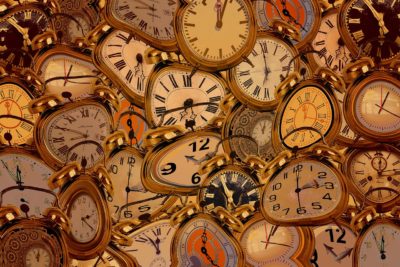
Writers sometimes ask which is better—tracking words or tracking time.
A daily word count can be doable. Or ghastly. Successful authors’ quotas vary greatly.* Ernest Hemingway strove for 500 words a day. On the other hand, Michael Crichton claimed to whip out 10,000 words at one go.
Many articles appear about word counts, but fewer articles focus on time tracking. Most “time” articles help us find time to write; for example, How to Find Time to Write. As for me, once I do find—or make—the time to write, counting time works better than counting words.
Why Time?
Emulating those best-selling word-counting writers, I tried tracking words, but gave up in red-faced chagrin. On good days, I could actually make it to twenty or thirty words.
Tracking time freed me from my inner word-count critic.
I discovered why this approach works for me. It might work for you, too. And here’s how:
- Relax into your writing session.
Start your writing sessions with an affirmation. I start my writing sessions with an affirmation: “I deserve.” No frenzied typing simply to fill the page or meet the word count. Note that I am not a fan of NaNoWriMo.
- Take your time.
Sink into your work—imagine the place, character, situation, day, or night. The time goal means that you take as much time as you need.
- Immerse yourself into the work.
As you go deeper into your work, you realize you may need information—about the environment, characters, clothes, or other details. So, you do research (bless the Internet). Of course, a little self-discipline is required not to keep clicking on PopSugar.
When I spot an information-rich article, I make a .pdf of it and place it in my folder of the current work. The article is then accessible for later reference.
- Incorporate the information you’ve found.
As I’m writing, I choose a little or lot and adapt it to the characters and setting.
Often, I write myself notes right in the draft: “HOW DOES SHE FEEL ABOUT THE ROCKY COASTLINE?” Later I can expand, edit, synopsize.
- Engage with what you’ve just learned.
I once wrote a story about a city woman who went to the country for a weekend. She experienced an epiphany of wonder when she picked wild berries in an overgrown field. After researching wild berries, I imagined myself in the field, the grasses tickling my legs, fragrant breezes caressing my hair, soft furry silk of the berries between my fingers as I placed them in my bucket. I wrote about it all and this piece was later published! Without the word-count constraint, you’ll be amazed at what ends up on the page.
- Ask questions.
If your current project doesn’t require research, and you don’t find the words coming, you have the freedom to stay quiet, connect with your Inner Writer, and ask yourself:
What do I want to express now?
What is my next step, my next word?
- Save your answers and thoughts.
Answers will come for the section you’re in or another section or even for the whole project. Write these thoughts down! Record them somehow. File them where you’re sure to remember them.
While writing my current novel, as I continued the current section, another scene floated in, almost full-blown. I obeyed—and drafted the whole thing. This was an important scene, and I placed it later in the book.
Allow the flowerings, the expansions, and yes, the digressions. They can supply precious material for this piece or another.
- Take time for “think time.”
Your fingers don’t have to be hammering every second to match or beat another writer’s word count. In our relentless do-and-achieve society, we rarely allow ourselves the delicious space of staring into the space of our vast inner universe. And we need this reflective, thinking time. Take Time for “Think Time” sums up this practice quite well.
Take time. If the ubiquitous to-do list rears its intrusive head, acknowledge it, scratch a reminder if you must, and let it go by. Then return to your floating now state. This is where wonderful, rich, truly productive ideas come from.

- Let go and let it flow.
You may find, to your consternation and delight, that after a few minutes the words start to flow.**
Sometimes, when I immerse and let go, I write a shocking amount in fifteen minutes, like 500 words (counting a little). In the Flow, we feel in control, powerful, wholly creative, alive. Words and ideas come effortlessly; insights pop up clear as winter air. The Flow is its own reward, and of course we accomplish our work.
- Enjoy the rewards of time tracking.
And finally, I track minutes over words for satisfaction—the satisfaction of producing at least part of a decent draft. With a hovering word quota, you’re tempted to type anything. When I do, I leave my desk with an unfulfilled, empty feeling, a feeling that I haven’t really done anything.
But when I let go of numbers to imagine and free my mind, words and images enter. These are the stuff of astounding similes and metaphors. In a recent session, as I stared into space living my protagonist’s loss, the perfect words arose: the loss felt “like a sinkhole threatening to suck me under.”
- Record Your Time
Record your time stints. I created a simple graph with five columns in Word (you can also use Excel): the day, date, time from-to, number or fraction of devoted hours, and project or title name. I keep my graph by the month, and it helps me see the times of day I’ve written, the better days and times, and my sustained efforts on various projects. (If you must, add a word count column.)
There are also electronic time trackers; check them out at Time Tracking Tools for Freelancers.
A Timely Conclusion
Of course, I am pleased when I produce a lot of words, or even barely acceptable ones, but nothing matches the Flow of luxuriating in the sacred time I’ve chosen to create. That’s why I count minutes over words.
It’s up to you to set your writing goals in whatever currency works best. You may need to experiment. Take the time to choose what most satisfies and motivates you as a writer.
Time over words? Or words over time?
_____________________________
* The Daily Word Counts of 39 Famous Authors; also On Writing: The Daily Word Counts of Famous Authors.
**See Mihaly Csikszentmihalyi’s Flow: The Psychology of Optimal Experience (1990)
© 2018 Noelle Sterne

Wendy Thornton
Good article – thank you, Noelle!
Noelle Sterne
Thank you, Wendy! Glad you liked it.
Joan H. Carter
You describe a way to write that’s fun! Besides, most writers tend to start out using way too many words and then need to cut, cut, cut. Much better not to cheer being wordy.
Noelle Sterne
Appreciate your comment, Joan. Even with “time” as a gauge, I still need to cut, especially because I type fast. Best in your own writing.
Ann~Marie Magné
I don’t know what category I’m in – I do neither. I sit and write and get up only
when pressed to do some “duty.” My most common spoken phrase is,”In a minute.”
Thanks, Noelle, for showing me a different perspective. Gotta go now. Time’s a wastin’.
Noelle Sterne
Thank you, Ann-Marie. Your “method” is enviable. Your perspective too is valuable. Must go now. Writin’s waitin’ . . .
Blakely Moore
Time over word count for sure! My goal is just to sit down and devote the time. If I do that, I’ll get enough work out. But the hardest part is just making myself start.
Noelle Sterne
Blakely–You are right. Getting to the writing place is the hardest. See how you can start with something simple–a little research, a short character sketch, a description of a setting. Maybe the start will then be less fearsome.
Bonnie T. Ogle
Lovely article. Good lesson for me. Regarding the rules: I break them all the time, not intentionally. I look forward to the time when I’ve learned them all and have earned the right to break them!
Bonnie T. Ogle
My apologies, Noelle. Rules comments should have been to another post. I do love your idea of time vs word count. Much more relaxing! Thanks!
Noelle Sterne
Thank you for your honesty, Bonnie. We can apply the “no rules” even to recommended word counts too. Glad you find the “time” count helpful. Very best in your writing.